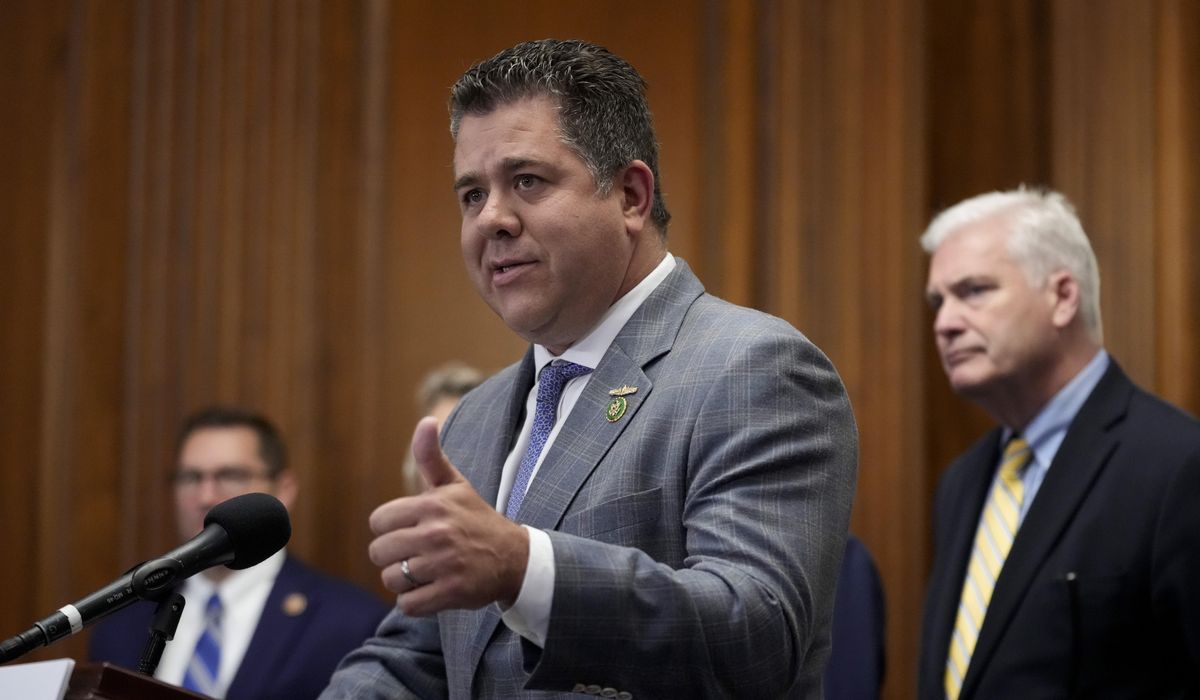


Senate defense hawks want to renegotiate a budget cap deal signed into law last year to spend an extra $25 billion on national security, but most House Republicans do not want to revisit the contentious spending level debate.
The House has managed to address pressing defense needs from deterring conflict with China to ensuring troops get a pay raise while sticking to budget caps, Republicans argue.
“They love to spend, those senators,” Rep. Nick LaLota, New York Republican, told The Washington Times. “Opening up the deal is opening up a can of worms and is probably not what we should do.”
Mr. LaLota, who serves on the House Armed Services Committee that oversees defense policy, said the 1% increase in defense spending the House has proposed, in alignment with the budget cap, “meets the moment.”
Republicans on the House Appropriations Committee, which oversees spending, had differing views about the Senate’s proposed defense increase. Some prefer to stick to the budget cap and others are sympathetic to spending more on defense to keep up with inflation and rising foreign conflicts.
But GOP appropriators seem to agree that renegotiating the spending limits would run contrary to their goal of cutting nondefense spending. Senate Democrats are demanding any boost to defense be paired with an equal percentage increase to domestic funding.
“It does make it problematic,” Rep. Mario Diaz-Balart, Florida Republican, told The Times. “So we’ll see what they try to come up with.”
Mr. Diaz-Balart is, however, supportive of increasing defense spending beyond the 1% allowed under the statutory limit.
“A 1% increase with inflation is basically a 5% reduction,” he said. “Obviously, logic would tell you that’s not good enough.”
More conservative members of the Appropriations Committee said they want to stick with the spending limits enacted last year as part of the debt limit law, the Fiscal Responsibility Act.
“It’s the law of the land. There’s no need to negotiate it,” said Rep. Andy Harris, Maryland Republican.
House Appropriations Chair Tom Cole, Oklahoma Republican, said the House will continue passing spending bills that adhere to the budget caps, including the defense appropriations bill that is on the floor this week.
As for his willingness to renegotiate spending levels with the Senate, Mr. Cole said, “Not between now and the election.”
“I’m all for additional money for defense, and we’ll sit down and bargain afterward,” he told The Times.
Mr. Cole also had a warning for Senate Democrats pushing for equal increases to nondefense spending: “They’ve got to learn to prioritize a little bit. It’s a lot more dangerous world than one would like right now, so I think defense ought to be the priority.”
While Mr. Cole would be involved in any negotiation over spending levels, he said any decision on whether to revisit the spending caps is up to House Speaker Mike Johnson, Louisiana Republican.
Mr. Johnson’s office did not respond to a request for comment. However, the speaker tends to consult his members on such decisions, and the prevailing view in his conference is to stick to the spending limit.
“The cap should stay where it’s at overall and something else has to give,” Republican Study Committee Chair Kevin Hern of Oklahoma said, noting GOP members would agree to increase defense spending in exchange for cuts to nondefense funding.
Senate Democrats would not go for that. They are already complaining House Republicans have not fully adhered to last year’s deal. In addition to the spending caps enacted into law, the deal included unenforceable side agreements involving budget maneuvers appropriators could use to spend more on defense and nondefense programs without technically breaching the law’s limits.
Since the side deal was brokered under former Speaker Kevin McCarthy, House Republicans, now under new leadership, have disregarded it.
House Republicans’ appropriations bills “ignore the deal that they negotiated in favor of devastating cuts to nondefense,” Senate Appropriations Chair Patty Murray said in a floor speech last week.
The Washington Democrat called on the Senate to “chart a different path” and “provide additional resources beyond the caps to address major shortfalls and new challenges.”
• Lindsey McPherson can be reached at lmcpherson@washingtontimes.com.
